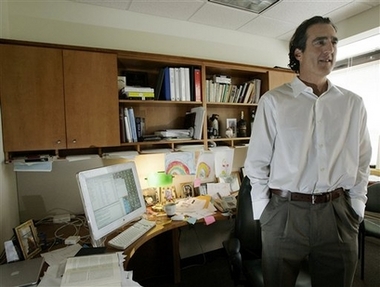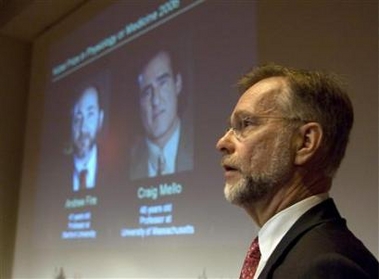Americans Andrew Z. Fire and Craig C. Mello won the Nobel medicine prize
Monday for discovering a method of turning off selected genes, an important
research tool that scientists hope will lead to new treatments for HIV, cancer
and other illnesses.

Craig Mello, a professor from the University
of Massachusetts Medical School in Worcester, Mass. is seen in his office
in Worcester, Mass. Monday, Oct. 2, 2006. Americans Mello and Andrew Z.
Fire won the Nobel medicine prize Monday for discovering a method of
turning off selected genes, an important research tool that scientists
hope will lead to new treatments for HIV, cancer and other illnesses.
[AP] |
The Karolinska Institutet in Stockholm
honored the pair for their relatively recent discovery of RNA interference,
which it called "a fundamental mechanism for controlling the flow of genetic
information."
Fire's and Mello's findings, published in 1998, opened a new field of
research that has helped researchers break down, or silence, specific genes to
help neutralize harmful viruses and mutations.
RNA interference occurs in plants, animals, and humans. It is already being
widely used in basic science as a method to study the function of genes and it
may lead to novel therapies in the future. AIDS researchers hope RNA
interference can help them develop new drugs to fight viruses such as HIV.

Goran Hansson, chairman of the
Nobel Committee, announces the recipients of this year's Nobel Prize in
medicine at a news conference in Stockholm, October 2, 2006.
[Reuters] |
"It looks very encouraging today,
but it's too early to say whether it will find an important place in the
therapeutic arsenal" against HIV, said Goran Hansson, chairman of the prize
committee.
Erna Moller, a member of the Nobel Assembly at Karolinska, said RNA
interference has already had a dramatic effect on the pharmaceutical and biotech
industries.
"When this came out ... there was an immediate spurring of new companies"
developing treatments based on the discovery, she said, adding that some,
including San-Francisco-based Sirna Therapeutics Inc. focus solely on producing
drugs using RNA interference.
RNA, or ribonucleic acid, is a biomolecule that can store and transmit
genetic information, similar to the role of DNA. In 1989, Americans Sidney
Altman and Thomas Cech were awarded the Nobel Prize in chemistry for discovering
RNA's catalytic properties.
Fire, 47, of Stanford University, and Mello, 45, of the University of
Massachusetts Medical School in Worcester, published their seminal work in the
journal Nature in 1998. The two men will share the prize, including 10 million
kronor (euro1.1 million; US$1.4 million).
The Nobel committees typically honor discoveries that have been tested over
decades, but Hansson said the findings by Fire and Mello had a big impact even
though they were published just eight years ago.
"We award the discovery of a fundamental principle," Hansson said. "That
principle has already been proven by scientists around the world. It has been
validated and the time is right to award a Nobel Prize."
Mello, reached at his home in Shrewsbury, Massachusetts, said the award came
as a "big surprise."
"I knew it was a possibility, but I didn't really expect it for perhaps a few
more years. Both Andrew and I are fairly young, 40 or so, and it's only been
about eight years since the discovery."
Fire, who conducted the research while at the Carnegie Institution, said the
research was part of a larger effort in the scientific community.
"You realize how many other people have been major parts of our efforts ...
building the infrastructure, building the science so that we can go in there and
do a few experiments and be very happy that we learned something," he told The
AP.
He said he wasn't entirely certain that he had won when called by the
institute.
"I was asleep, as most people would want to be at that hour. A gentleman from
the Nobel committee called. At first I was very excited, in fact I didn't catch
his name because I was just waking up. Then I thought I must be dreaming or
maybe it was the wrong number," Fire said. "When it came up on the Web site, I
figured it was probably right."
Last year's medicine prize went to Australians Barry J. Marshall and Robin
Warren for discovering that bacteria, not stress, causes ulcers.
The Nobel Prize in physiology or medicine prize kicked off two weeks of award
announcements ending with the Nobel Peace Prize on October 13. On Tuesday, the
physics prize will be announced, followed by the chemistry prize on Wednesday.
The economics prize will be announced October 9. No date for the literature
prize has been given, but it is likely to be announced on Thursday or on October
12.
Afred Nobel, the Swedish inventor of dynamite, established the prizes in his
will in the categories of literature, peace, medicine, physics and chemistry.
The economics prize is technically not a Nobel but a 1968 creation of Sweden's
central bank.
Winners receive a check for 10 million kronor, handshakes with Scandinavian
royalty, and a banquet on December 10 _ the anniversary of Nobel's death in
1896. All prizes are handed out in Stockholm except for the peace prize, which
is presented in Oslo.